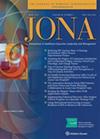如果护士设计人工智能会怎么样?
IF 1.9
4区 医学
Q2 NURSING
引用次数: 0
摘要
医疗保健领域的大多数人工智能(AI)都是为了支持现有的工作流程和行政优先事项而开发的,通常没有护士的观点。如果护士掌握人工智能设计会怎样?通过27位高级护理领导者的观点,本文研究了护士主导的创新如何影响护理服务中新兴技术的设计、采用和影响。本文章由计算机程序翻译,如有差异,请以英文原文为准。
What If Nurses Designed Artificial Intelligence?
Most artificial intelligence (AI) in healthcare is developed to support existing workflows and administrative priorities, often without the perspective of nurses. What if nurses were at the helm of AI design? Informed by the perspectives of 27 senior nursing leaders, this article examines how nurse-led innovation can influence the design, adoption, and impact of emerging technologies in care delivery.
求助全文
通过发布文献求助,成功后即可免费获取论文全文。
去求助
来源期刊
CiteScore
2.90
自引率
10.00%
发文量
0
审稿时长
6-12 weeks
期刊介绍:
JONA™ is the authoritative source of information on developments and advances in patient care leadership. Content is geared to nurse executives, directors of nursing, and nurse managers in hospital, community health, and ambulatory care environments. Practical, innovative, and solution-oriented articles provide the tools and data needed to excel in executive practice in changing healthcare systems: leadership development; human, material, and financial resource management and relationships; systems, business, and financial strategies. All articles are peer-reviewed, selected and developed with the guidance of a distinguished group of editorial advisors.

 求助内容:
求助内容: 应助结果提醒方式:
应助结果提醒方式:


